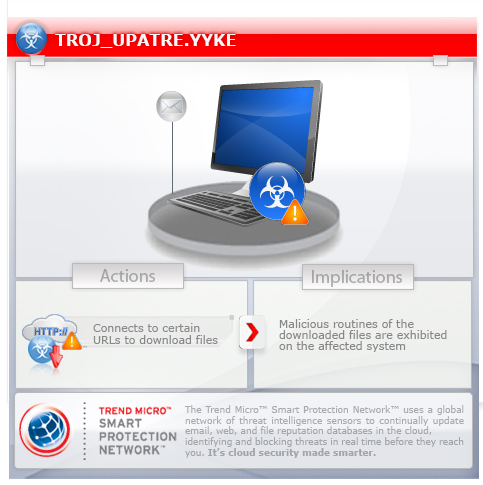TROJ_UPATRE.YYKE
TrojanDownloader:Win32/Upatre.A(Microsoft),Win32/TrojanDownloader.Waski.B trojan(NOD32),Trojan.Win32.Bublik.cehk(Kaspersky)
Windows 2000, Windows Server 2003, Windows XP (32-bit, 64-bit), Windows Vista (32-bit, 64-bit), Windows 7 (32-bit, 64-bit)


Threat Type: Trojan
Destructiveness: No
Encrypted:
In the wild: Yes
OVERVIEW
This malware is related to the new spam technique wherein a mail has an.MSG attachment. The said .MSG attachment, in actual contains this UPATRE variant.
To get a one-glance comprehensive view of the behavior of this Trojan, refer to the Threat Diagram shown below.

This Trojan arrives as an attachment to email messages spammed by other malware/grayware or malicious users.
It executes the downloaded files. As a result, malicious routines of the downloaded files are exhibited on the affected system.
It deletes itself after execution.
TECHNICAL DETAILS
Arrival Details
This Trojan arrives as an attachment to email messages spammed by other malware/grayware or malicious users.
Installation
This Trojan drops the following copies of itself into the affected system and executes them:
- %User Temp%\budha.exe
(Note: %User Temp% is the current user's Temp folder, which is usually C:\Documents and Settings\{user name}\Local Settings\Temp on Windows 2000, XP, and Server 2003, or C:\Users\{user name}\AppData\Local\Temp on Windows Vista and 7.)
Download Routine
This Trojan accesses the following websites to download files:
- http://{BLOCKED}dults.com/images/2703USd.git
- http://{BLOCKED}ark.com/Templates/2703USd.git
It saves the files it downloads using the following names:
- %User Temp%\kilf1.exe
(Note: %User Temp% is the current user's Temp folder, which is usually C:\Documents and Settings\{user name}\Local Settings\Temp on Windows 2000, XP, and Server 2003, or C:\Users\{user name}\AppData\Local\Temp on Windows Vista and 7.)
It then executes the downloaded files. As a result, malicious routines of the downloaded files are exhibited on the affected system.
Other Details
This Trojan deletes itself after execution.
SOLUTION
Step 1
Before doing any scans, Windows XP, Windows Vista, and Windows 7 users must disable System Restore to allow full scanning of their computers.
Step 2
Search and delete this file
- %User Temp%\kilf1.exe
Step 3
Scan your computer with your Trend Micro product to delete files detected as TROJ_UPATRE.YYKE. If the detected files have already been cleaned, deleted, or quarantined by your Trend Micro product, no further step is required. You may opt to simply delete the quarantined files. Please check this Knowledge Base page for more information.
Did this description help? Tell us how we did.


